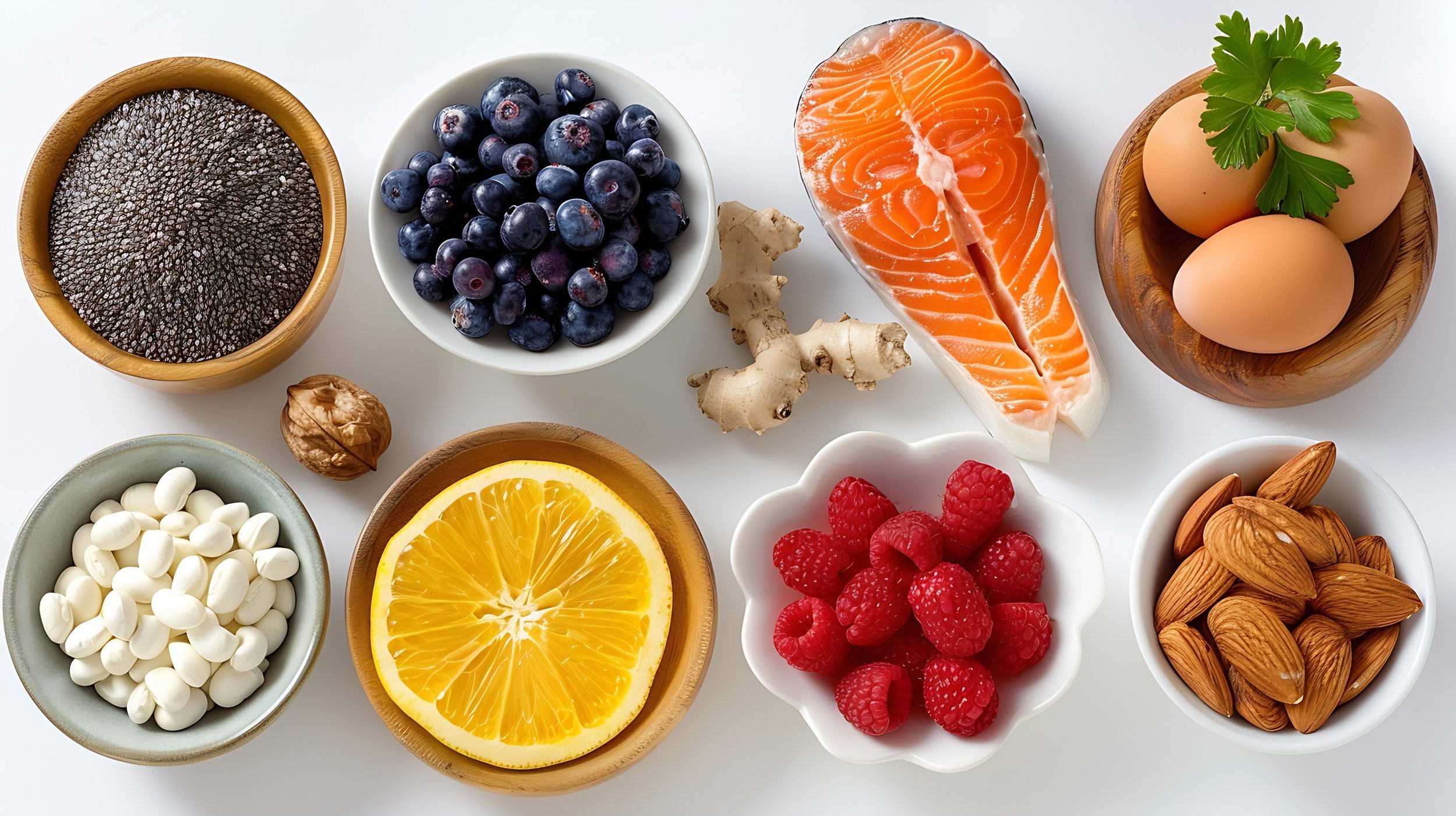Eat for Your Mood
Food as a Powerful Tool for Mental and Physical Health
Food is more than just sustenance—it is a powerful tool for promoting vitality and preventing illness. The right foods can stabilize blood sugar levels, improve cognitive function, and enhance overall well-being, while poor dietary choices can lead to mood swings, fatigue, and even long-term health complications. The impact of food on mood is especially evident when comparing whole, nutrient-dense foods with processed, high-sugar options. For example, consuming whole foods rich in vitamins and minerals supports steady energy and mental clarity, while excessive intake of refined sugars and processed foods can contribute to blood sugar crashes, irritability, and mental fog.
Boost Your Mood with Ginger-Garlic Shrimp & Veggie Stir-Fry
If you’ve ever noticed how certain foods make you feel more energized, focused, and even happier, there’s a reason for that! The nutrients in what we eat play a crucial role in supporting brain function, balancing hormones, and regulating mood. One dish that’s packed with mood-boosting ingredients is Ginger-Garlic Shrimp & Veggie Stir-Fry with Rice—a flavorful, nutrient-dense meal that can help uplift your spirit while nourishing your body. Here’s how each ingredient supports your mental well-being.
Importance of Balanced Macronutrients for Mental Health
Achieving a balance of macronutrients—protein, fats, and carbohydrates—is key to maintaining optimal mental health. Each macronutrient plays a specific role in brain function and emotional well-being.
Protein provides essential amino acids that help produce neurotransmitters like serotonin and dopamine, which are crucial for regulating mood and stress levels.
Healthy Fats, particularly omega-3 fatty acids found in foods like salmon, walnuts, and flaxseeds, support brain function and reduce inflammation, which has been linked to depression and anxiety.
Carbohydrates are the body's primary energy source, but the type of carbohydrate matters. Simple carbs, like refined sugars, cause blood sugar spikes and crashes that can lead to mood instability. In contrast, whole food carbohydrates, such as brown rice, quinoa, and sweet potatoes, provide sustained energy and help stabilize mood.
The Power of Blueberries for Brain Health
One standout mood-boosting food is blueberries. These tiny but powerful berries are rich in anthocyanins, a type of antioxidant that has neuroprotective properties. Regular consumption of blueberries has been shown to improve memory, reduce inflammation, and protect brain cells from oxidative stress. Including blueberries in your diet can contribute to long-term brain health and help combat age-related cognitive decline.
1. Shrimp (or Chicken) – Rich in Mood-Enhancing Nutrients
Shrimp and chicken are excellent sources of protein, which provides the body with amino acids like tryptophan, essential for serotonin production. Serotonin is often called the “happy hormone” because it helps regulate mood, sleep, and anxiety. These proteins also contain vitamin B12, which supports brain function and reduces symptoms of depression.
2. Garlic – The Brain-Boosting Superfood
Garlic is more than just a flavor enhancer—it’s packed with antioxidants that help reduce inflammation in the brain, which is linked to improved cognitive function and mood stabilization. It also supports gut health, which plays a crucial role in mental well-being.
3. Ginger – The Stress Reliever
Ginger is widely known for its anti-inflammatory and digestive benefits, but it also helps regulate stress hormones like cortisol. By reducing oxidative stress and inflammation, ginger can help alleviate anxiety and enhance overall brain function.
4. Vegetables – Nature’s Antidepressants
A colorful mix of vegetables like bell peppers, broccoli, and carrots provides a variety of essential vitamins and minerals. These veggies are high in folate, vitamin C, and antioxidants, which support neurotransmitter function and combat oxidative stress, helping to stabilize mood and energy levels.
5. Rice – The Comforting Carb
Carbohydrates, particularly whole grains like brown rice, play a key role in serotonin production. They help regulate blood sugar levels, preventing energy crashes and mood swings. Rice also serves as a grounding food, promoting feelings of stability and warmth.
How to Make This Mood-Boosting Meal
Sauté garlic and ginger in a bit of oil to release their flavors and health benefits.
Add shrimp or chicken and cook until golden brown.
Toss in vegetables and stir-fry until vibrant and tender-crisp.
Prepare the sauce with a combination of soy sauce, honey, and a dash of citrus for extra flavor.
Serve over rice and garnish with fresh herbs, sesame seeds, or avocado for an added nutritional boost.
Drink for Your Mood: Coconut Water Electrolyte Boost
Pair your meal with a refreshing, mood-enhancing drink that helps with hydration, brain function, and overall vitality. This simple drink includes:
Coconut water – A natural source of electrolytes that supports hydration and brain function.
Lime juice – Rich in vitamin C, which helps reduce stress and support immune function.
Celtic salt – Contains essential minerals to support electrolyte balance and prevent fatigue.
Collagen powder – Supports skin, joint, and gut health while also providing amino acids for neurotransmitter production.
Acerola cherry powder – A powerhouse of vitamin C and antioxidants that help combat stress and inflammation.
Mix these ingredients together for a refreshing, nourishing drink that keeps you energized and in a balanced mood throughout the day.
Final Thoughts
Food is more than just fuel—it’s a powerful tool for mental wellness. By incorporating meals like this Ginger-Garlic Shrimp & Veggie Stir-Fry into your diet, you’re not only treating your taste buds but also nourishing your brain and mood. Whether you enjoy it with shrimp or chicken, this dish is a delicious and natural way to uplift your spirit and support overall well-being.

